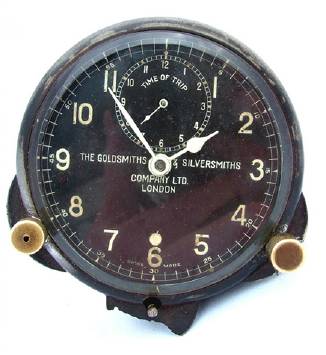AEROSPACE Brexit and UK aviation
Time to secure time?
Keeping time is a growing concern – and we all need to be alert to the risks to precision timekeeping – explains JAMES GRAY, Managing Director, Cyber & Intelligence, Raytheon UK.
 An RAF ‘Type’ MK.IIIA Cockpit Clock.
An RAF ‘Type’ MK.IIIA Cockpit Clock.
It is about time. Not a lot of people understand it, or where it comes from. But time is a critical factor to the way the modern world operates. The energy grid, banks, modern communication, our food supply chains and so many of the services that we all use every single day are all reliant on being able to accurately and consistently tell the time in a way that reliably matches with other clocks all around the world. As Professor Bryn James warned the Royal Aeronautical Society’s ‘Extreme threats to the UK’ conference: “Everybody who does anything in Western civilisation is dependent on precision timing from space.”
The way we have historically achieved this is through satellite timing systems, linked to GPS satellites. This means that the UK essentially takes its time from the US Naval Observatory in Washington.
It has been an excellent system but it is not without problems. This reliance on space technology generates vulnerabilities that we cannot control. From the weather to space debris, these uncontrollable forces can disrupt the basic tools of civilisation.
It is not just natural forces that have the power to disrupt time. It is not hard to search on the internet and find equipment designed to ‘spoof’ or disrupt GPS tracking and, in doing so, also disrupt the signals that dictate precision timing. This technology can be cheap and used by anyone, from organised criminals to the tradesman who simply does not want his employer to constantly track his location.
These devices act to jam communication between satellites and local GPS equipment. The smallest devices can draw their power from the cigarette lighter in your car but their effects can range as widely as hundreds of metres. The largest are commonly deployed by military forces and can impact several hundreds of kilometres.
Because that very same signal is used for accurate timing and jamming, this has the potential to be catastrophic. At the lowest impact, that means that one such tradesman could knock out a nearby cash machine as he parks up his car. But the highest impact would be incalculable.
This threat is a growing risk and governments and authorities need to be aware of it. From the disruption to our Critical National Infrastructure (CNI) and the way our country operates, we know this dependence on time comes with vulnerabilities – yet, time is hidden and attacks may not be obvious to the eye until it is too late.
A government-backed study from London Economics estimated that sustained disruption to existing satellite navigation capabilities could cost the UK economy £1bn per day. However, the British government is doing an excellent job of getting ahead of the game on these risks, establishing a National Timing Centre with multiple atomic clocks scattered across the country. These systems are designed with redundancies and multiple fail-safes to keep Britain ticking, including a wide range of different methods to secure reliable timing if satellite signal is disrupted.
This is a landmark effort that shows tremendous leadership and forethought and it is one that should be replicated globally as we seek to secure not just our time but also safeguard the global economies that are entirely reliant upon it.
Authorities around the world should be thinking about what they can do to create similar resilience but businesses also have a part to play here. It is vital that all sectors understand their dependence on undisrupted time and they are aware of where their vulnerabilities may lie.
If you run a railway franchise, a radio station or a video streaming platform or indeed, anything reliant on electricity, you have a responsibility to make sure your business recruits and trains staff to understand these vulnerabilities.
In all sectors, improving the resilience of our entire economic system could depend on our ability to build on this knowledge and create the contingency systems that keep the clocks working. After all, it’s about time.